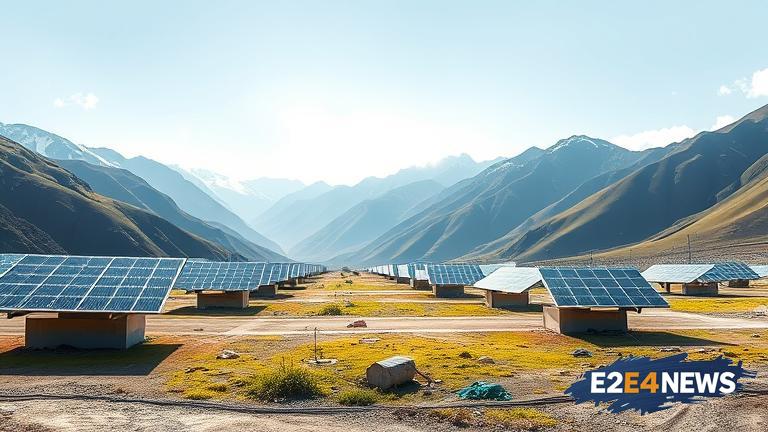In a bid to revitalize the flood-hit region of Gilgit-Baltistan, the government of Pakistan has announced an ambitious 100MW solar project worth Rs4 billion. This initiative is expected to not only provide a much-needed boost to the local economy but also help mitigate the effects of climate change. The project, which is set to be completed in the near future, will be a significant step towards reducing the region’s reliance on non-renewable energy sources. Gilgit-Baltistan, known for its breathtaking natural beauty, has been plagued by frequent floods in recent years, resulting in significant damage to infrastructure and loss of life. The solar project is seen as a beacon of hope for the region, which has been struggling to recover from the devastating effects of climate change. The government’s decision to invest in renewable energy is a testament to its commitment to sustainable development and reducing carbon emissions. The 100MW solar project is expected to generate enough electricity to power thousands of homes and businesses, providing a reliable source of energy to the local community. Furthermore, the project will also create new job opportunities, stimulating economic growth and development in the region. The solar project is part of a larger effort by the government to promote renewable energy and reduce the country’s reliance on fossil fuels. Pakistan has set ambitious targets to increase its use of renewable energy, with a goal of generating 60% of its electricity from renewable sources by 2030. The government has also announced plans to establish a number of new solar and wind power projects across the country, with a focus on promoting sustainable development and reducing carbon emissions. The flood-hit region of Gilgit-Baltistan is in dire need of investment and support, and the solar project is seen as a crucial step towards rebuilding and revitalizing the local economy. The project will not only provide a reliable source of energy but also help to stimulate economic growth and development, creating new opportunities for the local community. In addition to the solar project, the government has also announced plans to establish a number of new infrastructure projects in the region, including roads, bridges, and schools. These projects will help to improve the quality of life for local residents, providing them with better access to education, healthcare, and other essential services. The government’s commitment to the region is a testament to its dedication to promoting sustainable development and reducing poverty. The solar project is just one example of the government’s efforts to promote renewable energy and reduce carbon emissions, and it is expected to have a significant impact on the local community. The project will help to reduce the region’s reliance on non-renewable energy sources, promoting sustainable development and reducing the effects of climate change. In conclusion, the 100MW solar project is a significant step towards revitalizing the flood-hit region of Gilgit-Baltistan, promoting sustainable development and reducing carbon emissions. The project is expected to have a profound impact on the local community, providing a reliable source of energy, stimulating economic growth, and creating new opportunities for residents. As the government continues to invest in renewable energy, it is clear that Pakistan is committed to a sustainable future, and the solar project is just the beginning.





